It was snowing like billy-o here in Lancashire this
morning and it’s snowing again at the moment, and so we are all being advised
by the weather-Johnnies who are up to speed about this sort of thing that it’s
probably not the best idea to bother going out unless it’s really necessary,
which is all well and good by me as I’ve spotted a couple of bottles of Brown
Ale lurking in my kitchen that I’m sure won’t be around anymore come bedtime.
 |
| Sir Francis Bacon |
All this snow put me in mind of Sir Francis Bacon - well, that and the stuff
about J J Winckelmann I wrote earlier this week; I’ll come to the Bacon/snow
thing a little later but to start with Winckelmann. Just as he is considered to
be the first art historian and archaeologist so Bacon can be considered to be
the first modern scientist. Bacon was a polymath, he simply did so much
stuff it’s staggering to think it was the work of just one man. He was a
precocious boy, but a sickly one who was educated at home prior to going up to
Cambridge University at the age of twelve (not at all an unusual thing in the
past, when a different system of education was the norm), and he also attended
the University of Poitiers.
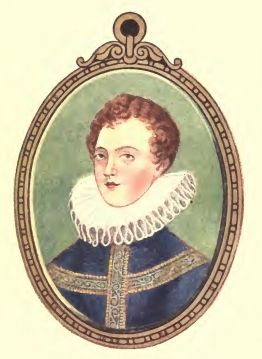 |
| Francis Bacon aged about eighteen |
He trained for the law but family connections meant
that he also gained some early experience of diplomacy although when his father
died unexpectedly in 1579, the eighteen-year-old Bacon began training as a
barrister in order to support himself. With the help of the patronage of his
uncle, Lord Burghley, he rose rapidly at the Bar and two years later he was
also elected as a Member of Parliament. His rise at the court of Elizabeth was
slower, if not positively glacial, but when James I became King all this
changed. Bacon himself acknowledged this in a later letter to the King, where
he wrote that James “ … had raised and advanced him nine times; thrice in
dignity, and six times in office.”
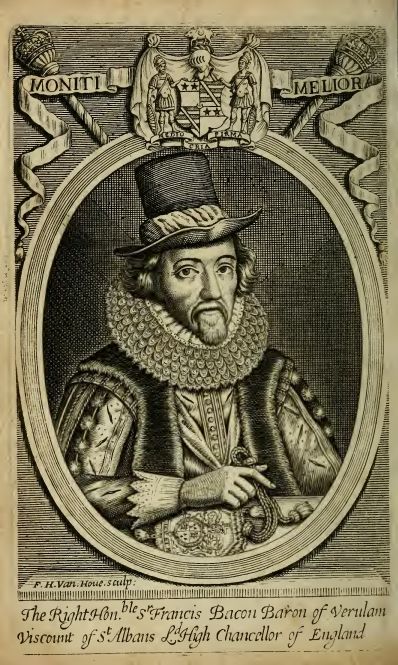 |
| Sir Francis Bacon, Baron Verulam and Viscount St Albans |
He was knighted in 1603, became Attorney
General in 1613 and Lord Chancellor in 1618, in which year he also became Baron
Verulam of Verulam, being further raised to Viscount St Alban in 1621. And
then, ruin! In that same year, Parliament charged him with twenty-three
separate counts of corruption, for which he was fined £40,000 and sentenced to
be held in the Tower of London awaiting the King’s pleasure (i.e. potentially
indefinitely). In reality, he was only imprisoned for a few days, the King
remitted the fine and Bacon narrowly escaped degradation (the removal of his
titles), but he was barred from holding further offices of state or sitting in
parliament. Instead, he withdrew from public life and devoted the rest of his
life to study and writing.
 |
| Sir Francis Bacon |
This was the silver lining of the dark cloud that
had descended over Bacon’s public life, as he spent the next five years of his
life experimenting, writing and thinking, unencumbered by the distractions of
court life, and up to this point what writing he had produced was done, in
effect, in his spare time. With unlimited time on his hands, he was free to
explore wherever his fancy took him, which was in some quite remarkable
directions. As early at his time at Cambridge, Bacon had been opposed to
Aristotelian methods of philosophy, which he regarded as ‘fruitless’, and
although most thinking undergraduates will find fault with their textbooks,
Bacon carried this dissatisfaction through to his adult life.
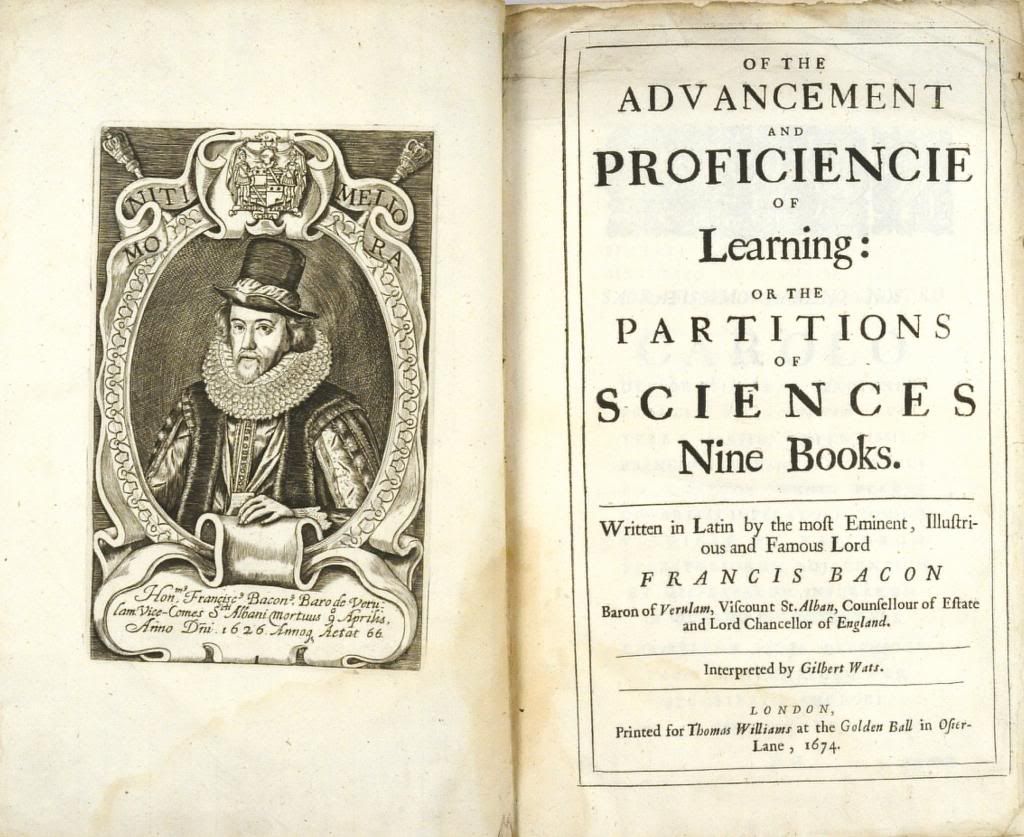 |
| Sir Francis Bacon - Advancement of Learning - 1605 (1674 ed) |
In his Advancement
of Learning (the full title is Of the Proficience and Advancement of
Learning, Divine and Human) of 1605, Bacon identified three ‘distempers’
that were barriers to true learning. He calls them Fantastical Learning, Contentious
Learning and Delicate Learning (or, vain imaginations, vain altercations, and
vain affectation).
The first, Fantastical Learning, is what today we might call
pseudoscience, it is the nonsense peddled by charlatans and deceivers, who
pretend to knowledge but theirs is knowledge without substance, often
self-referential, and carefully shielded from external criticism. It is, as
Bacon says, ‘the foulest’ as it seeks to destroy true knowledge.
The
second, Contentious Learning, is the scholasticism of the school of Aristotle,
to which Bacon had been exposed as a student. It values traditionalism and
debate for its own sake, it prefers quibbling and hair-splitting over the
acquisition of true knowledge, it goes round in stagnant circles and so makes
no forward progress.
Thirdly, Delicate Learning, which Bacon saw as the
mistaken reverence for the works of the Ancients for their own sake. Texts that
had long ‘slept in libraries’ were being read again but instead of using
the knowledge contained in those books, they were used as models for literary
pretensions, to revive Ciceronian rhetorical embellishments and the prose
styles of the Ancients. It is the triumph of style over content, not what you
say but how you say it. For Bacon, knowledge was to be used for the benefit of
mankind, to make progress, to learn and to discover new things.
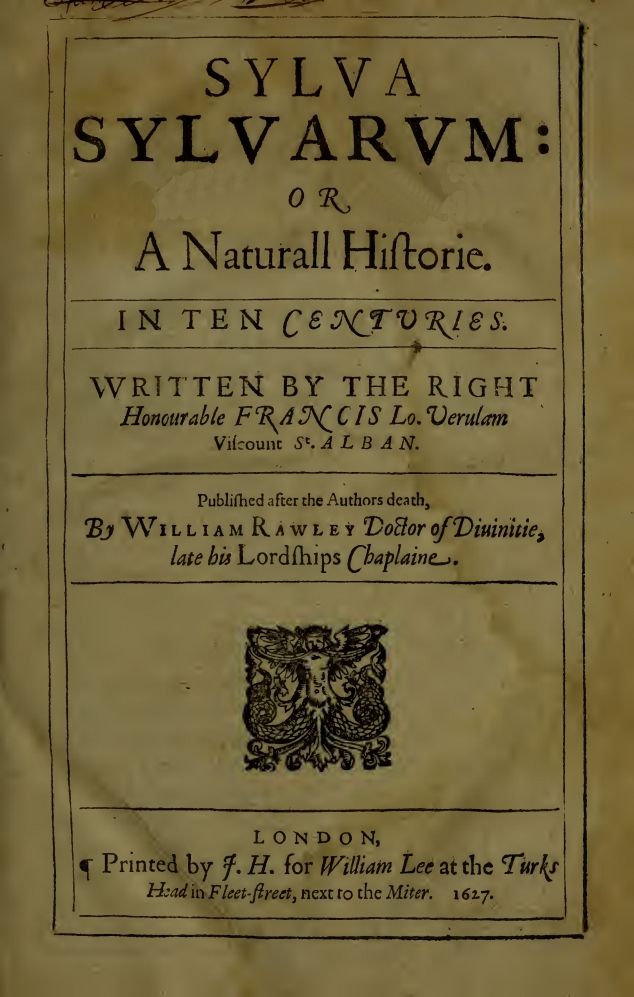 |
| Sir Francis Bacon - Sylva Sylvarum - 1627 |
In his De
Hæresibus (1597), Bacon wrote ‘Ipsa scientia potestas est’ –
Knowledge is Power – and it was the acquisition of Knowledge that drove Bacon
to develop his scientific methods, which valued empirical knowledge, knowledge
gained from experiments and observations, knowledge gained from inductive
reasoning. In this, Francis Bacon is the father of the modern scientific
method, he was the first to say, in effect, don’t believe what you’re being
told is the truth just because it is written in a book, get out there and look
at it yourself, ask questions and do experiments and learn about it for
yourself.
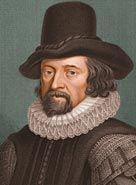 |
| Sir Francis Bacon |
So, what was that thing about Bacon and snow at the beginning? Well,
the story goes that Bacon was out in his coach on one snowy day and it occurred
to him that the coldness of the snow might possibly be used as a preservative
to keep meat fresh. He stopped the coach and bought a chicken from a woman at
her stall at the bottom of Highgate Hill, then went out into the snow and
stuffed some of it into the body cavity of the fowl. He was so engrossed in his
experiment that he neglected to keep himself warm and was eventually overcome
by the cold. Unable to go on, he struggled to the nearby house of the Earl of
Arundell, where he was put into a damp, unaired bed. His cold developed into
pneumonia and he died from ‘suffocation’ two days later, on April 9th
1626, aged 65.
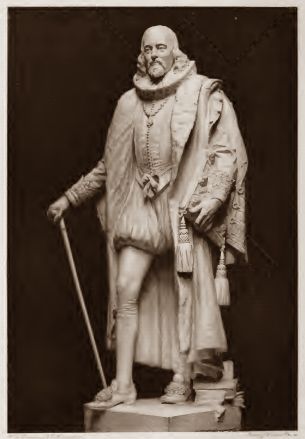 |
| Statue of Sir Francis Bacon |
But the story of Sir Francis Bacon doesn’t stop
there. Dearie me, no.
No comments:
Post a Comment